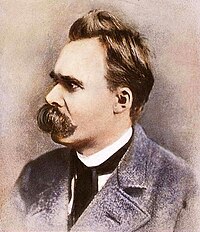
Friedrich Nietzsche , October 15th 1844
Excerpts from THUS SPOKE ZARATHUSTRA / Also Sprach Zarathustra
Introduction, 4
Zarathustra, however, looked at the people and wondered. Then he spake thus:
Man is a rope stretched between the animal and the Superman--a rope over an abyss.
A dangerous crossing, a dangerous wayfaring, a dangerous looking-back, a dangerous trembling and halting.
What is great in man is that he is a bridge and not a goal: what is lovable in man is that he is an OVER-GOING and a DOWN-GOING.
I love those that know not how to live except as down-goers, for they are the over-goers.
I love the great despisers, because they are the great adorers, and arrows of longing for the other shore.
I love those who do not first seek a reason beyond the stars for going down and being sacrifices, but sacrifice themselves to the earth, that the earth of the Superman may hereafter arrive.
I love him who liveth in order to know, and seeketh to know in order that the Superman may hereafter live. Thus seeketh he his own down-going.
I love him who laboureth and inventeth, that he may build the house for the Superman, and prepare for him earth, animal, and plant: for thus seeketh he his own down-going.
I love him who loveth his virtue: for virtue is the will to down-going, and an arrow of longing.
I love him who reserveth no share of spirit for himself, but wanteth to be wholly the spirit of his virtue: thus walketh he as spirit over the bridge.
I love him who maketh his virtue his inclination and destiny: thus, for the sake of his virtue, he is willing to live on, or live no more.
I love him who desireth not too many virtues. One virtue is more of a virtue than two, because it is more of a knot for one's destiny to cling to.
I love him whose soul is lavish, who wanteth no thanks and doth not give back: for he always bestoweth, and desireth not to keep for himself.
I love him who is ashamed when the dice fall in his favour, and who then asketh: "Am I a dishonest player?"--for he is willing to succumb.
I love him who scattereth golden words in advance of his deeds, and always doeth more than he promiseth: for he seeketh his own down-going.
I love him who justifieth the future ones, and redeemeth the past ones: for he is willing to succumb through the present ones.
I love him who chasteneth his God, because he loveth his God: for he must succumb through the wrath of his God.
I love him whose soul is deep even in the wounding, and may succumb through a small matter: thus goeth he willingly over the bridge.
I love him whose soul is so overfull that he forgetteth himself, and all things are in him: thus all things become his down-going.
I love him who is of a free spirit and a free heart: thus is his head only the bowels of his heart; his heart, however, causeth his down-going.
I love all who are like heavy drops falling one by one out of the dark cloud that lowereth over man: they herald the coming of the lightning, and succumb as heralds.
Lo, I am a herald of the lightning, and a heavy drop out of the cloud: the lightning, however, is the SUPERMAN.--
~ ~ ~
Earth sources of power understood him well :( .
Two most ridiculous interpretors of a terrible misuse of Nietzche`s genius are :

&

PANDEMONIUM vs TRANQUILITY :)